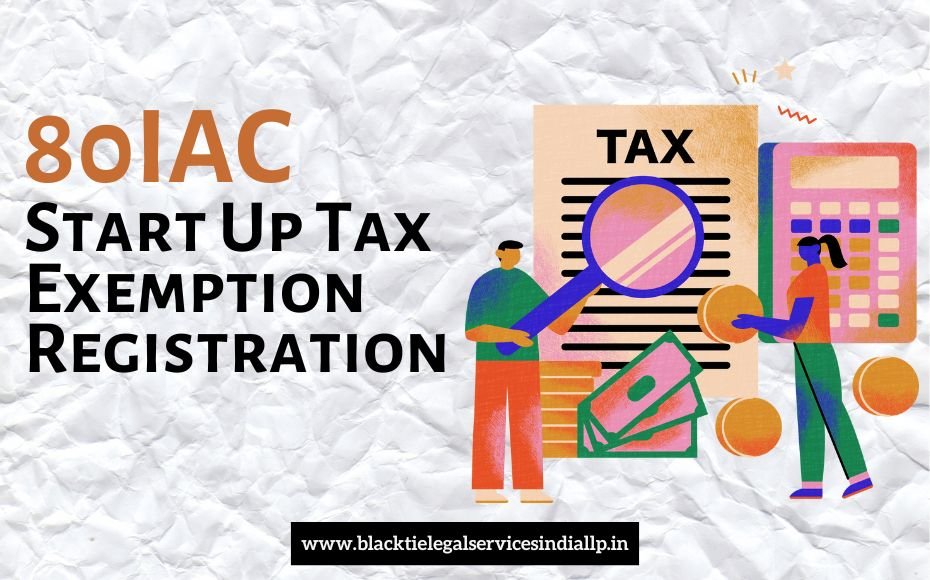80IAC – Start Up Tax Exemption Registration

The 80IAC – Start Up Tax Exemption is a new initiative that aims to help start-ups during their early stages when they may face financial challenges. Basically, it allows a start-up that has been recognized by the Department of Industrial Policy and Promotion (DPIIT) to enjoy a 100% tax exemption on the profits it earns in a financial year. Exemption can be claimed for any 3 consecutive financial years. So, it’s a great way to support start-ups and encourage their growth. The 80IAC – Start Up Tax Exemption is formed under Section 80IAC of the Income Tax Act in India.

Free Consultation by Expert
Anas Khan – Delhi, India Read More
Efficient 80IAC startup tax exemption registration—clear guidance and fast processing.
Ejaj Khan – Bihar, India Read More
Seamless 80IAC tax exemption registration with expert support and quick turnaround.
Vanshika Sharma- Uttar Pradesh, India Read More
Smooth 80IAC startup tax exemption process—handled professionally and efficiently.
Who is eligible for is 80IAC – Start Up Tax Exemption
registration?
To be eligible for the 80IAC – Start Up Tax Exemption, start-ups need to meet certain criteria. Here are some key eligibility requirements:
Recognition by DPIIT: The start-up must be recognized by the Department for Promotion of Industry and Internal Trade (DPIIT). They have specific criteria for recognition, such as innovation, scalability, and potential for employment generation.
Date of Incorporation: The start-up should have been incorporated after April 1, 2016, but before April 1, 2021.
Company Structure: Only private limited companies or Limited Liability Partnerships (LLPs) are eligible.
Turnover Limit: The startup’s turnover must not exceed Rs. 100 Crore in any financial year for which the exemption is claimed.
New Entity: The startup cannot be formed by splitting up or reconstructing an existing business (with some exceptions).
Innovation Focus: The startup’s business model should be involved in innovation, development, and have the potential to be scalable.
Meeting these eligibility criteria can pave the way for start-ups to benefit from the 80IAC tax exemption. It’s a great opportunity for qualifying start-ups to enjoy tax benefits and foster their growth!
What are the benefits of is 80IAC – Start Up Tax Exemption registration?
The 80IAC – Start Up Tax Exemption has some awesome benefits for qualifying start-ups. Here’s what you need to know:
- No Taxes on Profits: Eligible start-ups can enjoy a complete exemption from taxes on their profits for three consecutive years out of their first ten years of operation. That means more money in their pockets to invest back into their business!
- Financial Relief: By saving on taxes, start-ups can allocate more resources towards research, development, hiring talent, and scaling their business. It provides a financial boost during the crucial early years.
- Promotes Entrepreneurship: The tax exemption encourages more people to start their own businesses and creates a supportive environment for start-ups to thrive. It’s all about fostering entrepreneurship and driving economic growth.
What is the whole process of 80IAC – Start Up Tax Exemption registration?
I can walk you through the process of availing the 80IAC – Start Up Tax Exemption. Here are the steps:
- Eligibility: First, make sure your start-up meets the eligibility criteria.Plutorooms .It should be recognized by the Department of Industrial Policy and Promotion (DIPP) and certified by the Inter-Ministerial Board (IMB).
- Application: Once you meet the eligibility requirements, you need to apply for the tax exemption. You can do this by submitting Form IAC to the assessing officer of the Income Tax Department.
- Documentation: Along with the application form, you’ll need to provide supporting documents such as your start-up’s certificate of recognition from DIPP, audited financial statements, and any other relevant documents as required.
- Assessment: The assessing officer will review your application and supporting documents.
- Approval: If your application is approved, you’ll receive a certificate of eligibility for the 80IAC tax exemption. This certificate will specify the number of years for which you’re eligible for the tax exemption. Plutorooms
- Tax Exemption: Once you have the certificate of eligibility, you can enjoy the tax exemption on your start-up’s profits for the specified number of years. Make sure to comply with any reporting or compliance requirements during this period.
What are the required documents for 80IAC – Start Up Tax Exemption registration?
To apply for the 80IAC – Start Up Tax Exemption, you’ll typically need the following documents:
- Certificate of Recognition: This is the certificate issued by the Department of Industrial Policy and Promotion (DIPP) that recognizes your start-up as eligible for the tax exemption.
- Audited Financial Statements: You’ll need to provide audited financial statements for the relevant assessment year(s). These statements should reflect your start-up’s financial position, including profit and loss statements, balance sheets, and other financial documents.
- Form IAC: This is the application form for claiming the tax exemption. You’ll need to fill out and submit this form.
- Supporting Documents: Depending on the specific requirements, you may need to provide additional supporting documents such as the Memorandum of Association, Articles of Association, details of shareholders and directors, details of patents or intellectual property, and any other relevant documents as requested.
